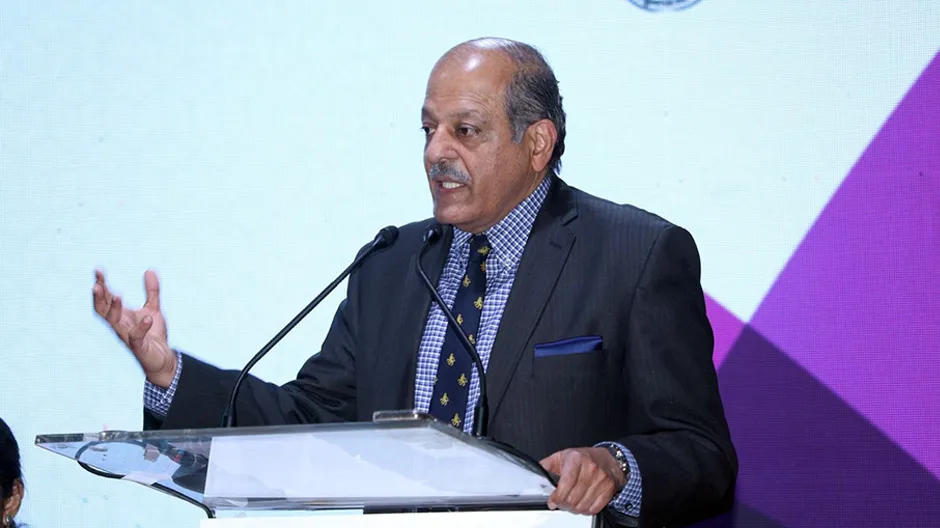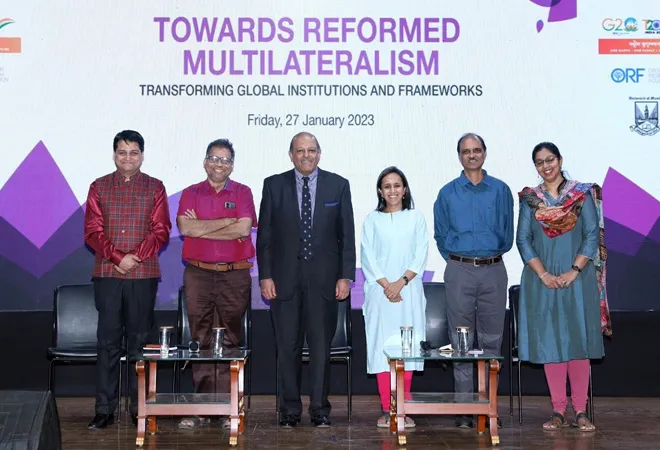The post-Cold War era has seen the emergence of two extremes of ideological and developmental models represented by the American-led ‘liberal world order’ and China’s enormous economic surge. These disruptions have led to deepening power struggles along the ‘six Ts’ of trade, technology, territory, terrorism, tenets, and trust, said Amb. Sujan R. Chinoy, Director General, Manohar Parrikar Institute for Defence Studies and Analyses and the Chair of the Think20 (T20) Core Group, the official engagement group of the G20 under India’s presidency. He was addressing an interactive session on ‘Towards Reformed Multilateralism: Transforming Global Institutions and Frameworks’, that is also the theme of T20’s Task Force 7 (TF7), organised by the Observer Research Foundation (ORF) and the Department of Civics and Politics and the School of International Relations and Strategic Studies (SIRSS), University of Mumbai, on 27 January 2023. Over 200 students and faculty from the University of Mumbai and various other affiliated and private colleges and institutions attended the session.
Giving his introductory remarks, Professor Harsh V. Pant, Vice President of Studies and Foreign Policy, ORF and co-chair of T20’s TF7, briefed the audience about the rapidly evolving global world order reflective of the shift in power dynamics. He said that the disruptions in the global supply chains during the COVID-19 pandemic laid bare the weaknesses of multilateral organisations, crippled further by the ongoing Russia-Ukraine crisis. In this context, he highlighted the urgent “need to analyse the functioning of the multilateral organisations and ideate on their reconceptualisation”.
The swings in the United States-China relationship over time and the decline of Europe have influenced international dynamics to a great extent, calling for reforms to not only the Bretton Woods institutions but also the United Nations (UN), which has increasingly experienced trends of exceptionalism. At the same time, the world has confronted simultaneous challenges characterised by the ‘six Ts’:
- Trade – Growing trends of protectionism, regionalism, tariff and non-tariff barriers
- Technology – Threats due to increasing weaponisation of technology
- Territory – Historical differences among nations leading to conflicts for territorial control
- Terrorism – Between nations, state-sponsored, and radicalisation
- Tenets – Friction between different socio-economic models of development
- Trust – International Relations, characterised by a lack of trust where no one is a permanent friend; there is only permanent interest.
Giving a historical perspective of the emergence of multilateral institutions such as the UN, its agencies, and other international finance and trade bodies formed following World War II, Amb. Chinoy explained how they had lost relevance in the emerging world order of the 21
st century and the accompanying frictions mentioned above. The UN system was established in 1945 primarily to ensure global peace and stability but has increasingly suffered exceptionalism.
Over the decades, China has been the biggest beneficiary of the UN system. However, its rapid militarisation coupled with aggressive global posturing is a new challenge confronting the world. China has also used its growing economic clout to establish parallel institutions within the global south, such as the Asian Infrastructure Investment Bank. While the power asymmetries have widened because of China’s growing prominence, smaller multilateral groupings in the Indo-Pacific seek to establish a counterbalance.

The G20 presidency has lent India a chance to steer global policies and international responses to the deepening power struggles. “While it is important for India to represent the interest of the global south, it will also have to take into account the interests of the West for bringing about an effective change,” he concluded.
In the engaging Q&A session, Amb. Chinoy and Prof. Pant answered several questions regarding the US’ role in the current geopolitical situation, the impact of domestic politics on the international relations of countries such as China and Taiwan, and the road to institutional reforms.
This report has been complied by Radhika Sareen, Research Intern, and Dhaval Desai, Vice President of ORF Mumbai.
The views expressed above belong to the author(s). ORF research and analyses now available on Telegram! Click here to access our curated content — blogs, longforms and interviews.

 The G20 presidency has lent India a chance to steer global policies and international responses to the deepening power struggles. “While it is important for India to represent the interest of the global south, it will also have to take into account the interests of the West for bringing about an effective change,” he concluded.
In the engaging Q&A session, Amb. Chinoy and Prof. Pant answered several questions regarding the US’ role in the current geopolitical situation, the impact of domestic politics on the international relations of countries such as China and Taiwan, and the road to institutional reforms.
The G20 presidency has lent India a chance to steer global policies and international responses to the deepening power struggles. “While it is important for India to represent the interest of the global south, it will also have to take into account the interests of the West for bringing about an effective change,” he concluded.
In the engaging Q&A session, Amb. Chinoy and Prof. Pant answered several questions regarding the US’ role in the current geopolitical situation, the impact of domestic politics on the international relations of countries such as China and Taiwan, and the road to institutional reforms.